Welcome to our live blog where we'll regularly share something of the goings on in the department.
Summer 2024
Why the Location of the Parthenon Marbles Matters: Reflections on Classics, Culture and Colonialism
Prof. Richard Alston
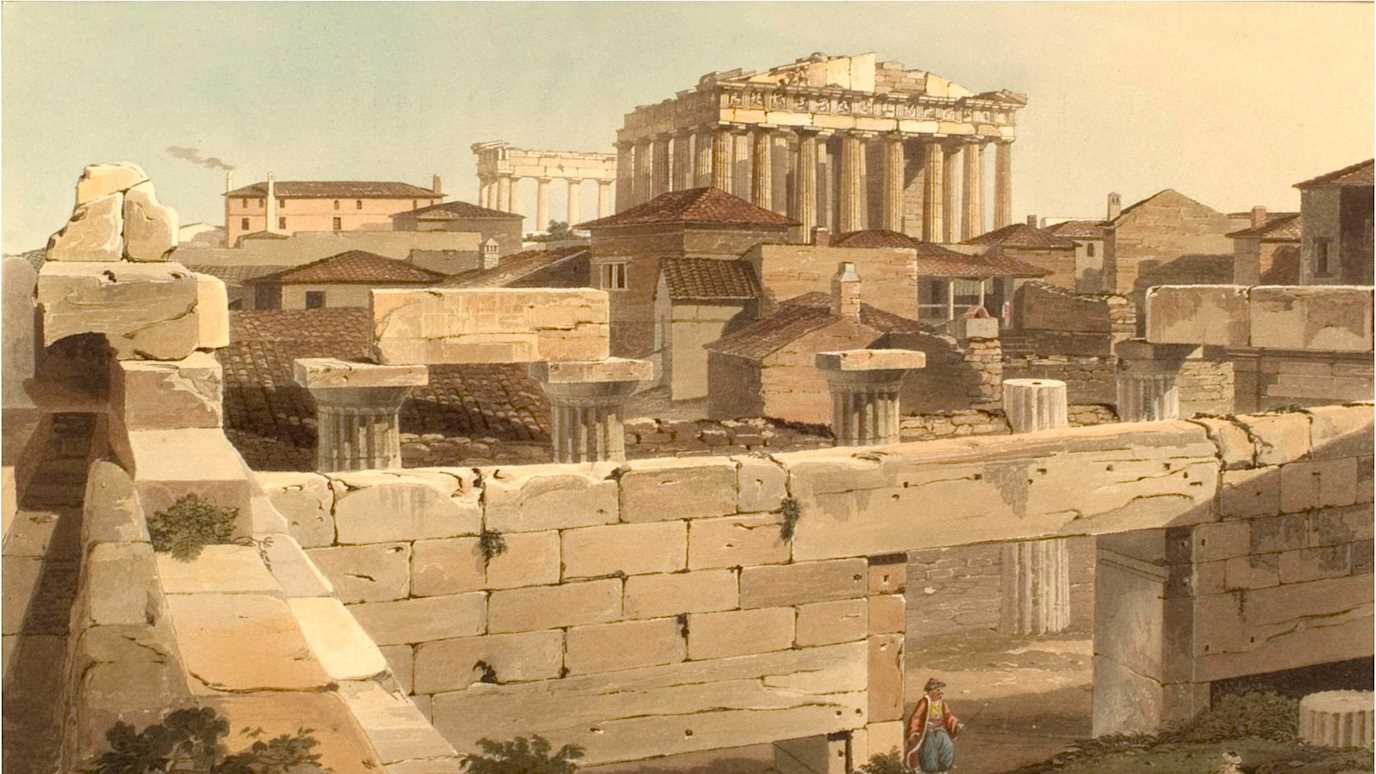
Cabinet ministers rarely comment on museum policies. Still rarer do Classical artefacts become front-line news in the cultural wars. But the Parthenon Marbles are an exception. The recent visit of the Greek Prime Minister, Kyriakos Mitsotakis, became a full-scale diplomatic spat when Mitsotakis restated, in answer to a direct question, the long-held Greek policy that the Marbles be returned to Athens. Rishi Sunak cancelled meetings, issued press releases, and despatched his culture warriors to go out and brief the press. My informants at the Greek embassy tell me that Mitsotakis, who learnt of his cancellation from X, was initially annoyed, then delighted. He was in London for a relatively low-key celebration of the life of Lord Byron, the Romantic poet and fighter for Greek freedom. But now his visit was headline news in Britain and Greece. The Prime Minister could be seen as standing up for Greek culture and heritage. The Parthenon Marbles were being debated and discussed and this coverage was the only way he could advance his country’s case. Whether this played well for Mr Sunak is not so obvious.
Royal Holloway Classics had already booked Professor Angelos Chaniotis of Princeton University to deliver the Dabis lecture, our annual summer public lecture. Angelos has a claim to be the most eminent living historian of the ancient Greek world. He advises a host of cultural institutions on their cultural policies including the New York Metropolitan Museum. There is no-one who is in a better position to provide an insight into the debates on the Marbles. I was honoured to respond to his lecture.
Angelos took us through the cultural and legal arguments. The marbles have been in the UK for 212 years and were on the Parthenon in Athens for nearly 2,300 years before being removed by Lord Elgin. In the UK, the marbles are often called ‘The Elgin Marbles’, which is bit like associating the Mona Lisa with Francis I of France rather than Leonardo da Vinci. Angelos demolished the legal arguments that Elgin had legal rights over the marbles. Those argument were regarded as spurious by many in the late eighteenth century. Even since the lecture, those legal arguments have been further questioned by the absence from the extensive Ottoman archives of any record of Elgin’s permission to remove the marbles. And, as a note, the Ottoman bureaucracy was extensive and their archives are extraordinary in their completeness: such a legal document should be there. Angelos showed how the separation and removal of the marbles is contrary to UN cultural heritage agreements, which establish ground rules for museums and the restoration of looted artefacts. He argued for a reconnection of the marbles, which are architectural features, with the Parthenon on art historical grounds and in restitution of a historical wrong.
My contribution was to situate the debate within the legacies of colonialism, not just Ottoman domination of Greece, but also of the subsequent Western European attitudes towards Greece. After the Greek War of Independence in the first half of 19th century, the Great Powers installed a Bavarian government. They justified this by arguing that the Greeks were unfit to rule themselves. One consequence was to see the Greeks not as heirs to their Classical legacy, and to claim that Greek Classics belonged to Europe. Thus, Classical Greek artefacts were better located in the great museums of the colonial powers. That argument has been maintained, even if moderated, over the subsequent centuries, and explains why little annoys my Greek friends more quickly than the UK’s political statements about the marbles: they are part of a long history of the (former) Great Powers diminishing the Greek state and Greeks themselves.
The argument on the Marbles is caught up in nationalism and colonial legacies. That poses a problem. It is almost an article of faith in our Royal Holloway community that:
Classics belongs to no one Classics belongs to everyone
This is central to our teaching and research. We would not endorse a Greek nationalist claim to the Marbles nor a British colonial claim. So where should the Marbles be?
It seems to me that there is only one answer to that: Athens. The reasons are historical, archaeological, and political. Taking the Marbles to London turned them into pure art. We are supposed to admire the workmanship and style. But the Marbles were so much more than pure beauty. They are/were a representation of the Athenian community. The Parthenon was the religious centre of Athens for millennia and the Marbles are part of that heritage. As Elgin transported them to the Piraeus, the inhabitants of Athens protested: part of their culture was being stolen. To understand the Marbles best, we need to see them in their urban, archaeological context and alongside the remains of the community that built and first valued them. In museological terms, they are far better displayed in the bright sun of Athens, in the spectacular Acropolis museum, than in a room in London. Why should an Athenian have to come to London to see the Marbles rather than a Londoner go to Athens?
There are other political reasons to return them: Britain struggles with the legacies of colonialism. It poisons elements of our cultural life and is weaponised by those who want to divide us. But our community was not divided by this debate. A university is a place where we need to discuss important issues, rationally and with passion. It is our function to talk through difficult issues and pose controversial questions.
In the discussion that followed the lecture, our community came to together to talk. We had about 150 people in the hall. Friends, members of the public, academic staff, post-graduate students and our undergraduates had their say. Many representatives of the Greek community came to join us, including staff from the Greek Embassy. One of the most eloquent contributions came from a first-year student, less than six months into their degree, happy to voice her opinion in front of such an audience.
The event was a brilliant example of what we do: we talk about important issues and we do that together and with respect. We value everyone from our first years to our professors. We take our debates into the community: no ivory tower for us.
The past is always with us. We can’t make a better future without it.
With many thanks to Angelos.
For a recording of the event see https://youtu.be/PQpwPaTUU_Q?si=dl1NtgnO2frg_1Gi
For more on Classics and modern issues, see https://www.royalholloway.ac.uk/research-and-teaching/departments-and-schools/classics/news/studying-the-classical-world-classical-views-on-modern-issues-11th-july/
On the Delights of Marking
Dr Liz Gloyn
“May is marking month in our department! Especially the last two weeks of it were particularly intense as I’ve had three modules-worth of work come in at once, so everything else had to be put to one side to work through it. You could tell this is the case from the state of my office at home, particularly my desk: with reference books and bits of paper strewn all over it, it was slowly but steadily sinking into quite an advanced state of chaos!
I’ve mainly been involved with teaching third year modules this year, which means that even though getting everything marked in time for the marking deadline has been intense, I’ve had the pleasure of looking at work produced by students at the peak of their academic careers with us. This has included students’ own adaptation of ancient myths for our Thinking Myth module, which always showcases amazing innovation and creativity in a wide range of different media, this year including videogame design and scriptwriting. I’ve also had the pleasure of marking our finalists’ dissertations, which are the capstone of a year working on a project of their choice. It’s one of the delights of this role that when a second year asks me ‘can I do my dissertation on this?’ that I’m usually able to say ‘of course’ and point them to the right person! I think it’s a real strength of how we operate that our students work on such a wide range of fascinating topics for their dissertations, and that we’re able to facilitate some real passion projects as a result. The proof really is in the pudding with these pieces of work – the amount of concentrated thought and reflection that’s been put into them really shows.”
The Futility of Revenge in Homer’s Odyssey: an art exhibition
Megan Griffin, 2nd year Classical Studies student
"During the last week of the Easter holidays, I put on an art exhibition in the library event space surrounding the theme of Revenge in Homer’s Odyssey, though it was only a short exhibition I felt so lucky to welcome over 160 visitors and share the Homeric tradition with so many people both within and outside of the university community. This exhibition was many of my visitors' first time hearing about Homer and I found myself retelling the legend of Odysseus many times over the three days that it ran, increasingly finding better ways to relate its subject matter to new audiences with each retelling. This was a task that was easier than I had expected as I increasingly realized that, despite its antiquity, the Odyssey and Iliad continued to entice audiences today with universal themes that transcend through time.
I also had the pleasure of welcoming many Classicists who were still on campus over the holidays and had many interesting conversations about the Odyssey and the possibilities presented by communicating ancient poetry through modern art. This was my first ever art exhibition and though it was extremely challenging (creatively, academically, emotionally, and organisationally) I also found the whole project profoundly rewarding. Through engaging creatively with the Homeric tradition, I feel I have developed a far greater appreciation of the epics and understand the artistry of Homer to a deeper level. Homer is not a static phenomenon but one that has emerged from years of composers engaging and developing a poetic tradition; it is by continuing to engage in new and creative ways with this tradition that we keep it alive.
I am so grateful to the department of Classics and especially Nick Lowe for allowing me the opportunity to put on an event like this and for supporting me through it. I’d also like to thank everyone who came and were so positive about my artworks; hopefully I will be welcoming many of you back to a bigger, better exhibition next year."
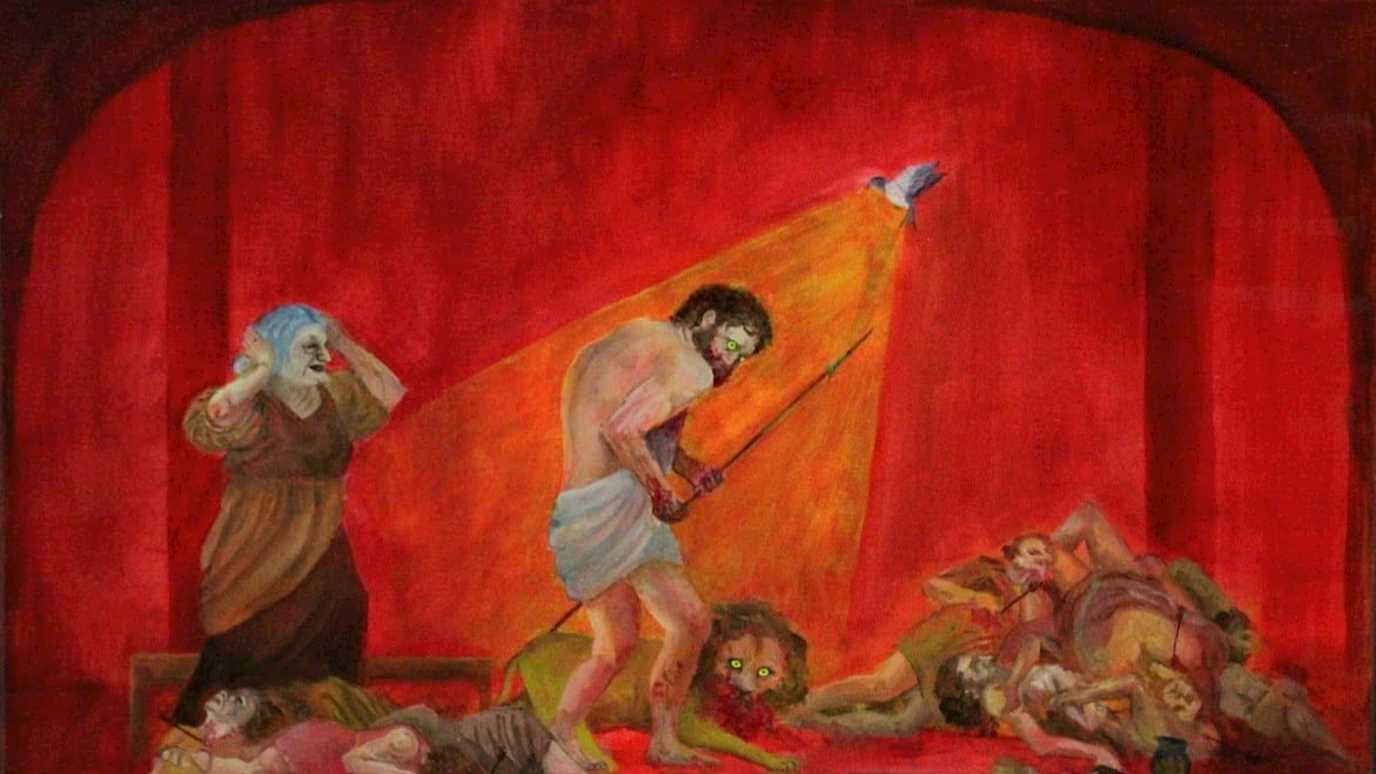
Mothers and Daughters: a creative writing workshop with Demeter and Persephone
Jojo Hills, Masters by Research in Classical Reception
"I was extremely fortunate to run a workshop at Regent’s University this week as part of my internship with Myth and Voice (http://mythandvoice.org/), led by Dr Efi Spentzou. I was working with a creative writing class, which featured a group of undergraduate students who came from a variety of backgrounds and academic courses, from Thailand to Hawaii to Denmark, from psychology to media and communications to international relations and more!
As well as for my internship, I had created this workshop with Efi as part of my master’s thesis, which examines the use of the myth of Demeter and Persephone from the 19th century to modern day, and how retellings of the myth throughout history reflect changes in the female experience. The group took the myth extremely well, they approached the workshop with enthusiasm and had some fantastic thoughts.
I was quite nervous ahead of the workshop, as it had been a while since I led a group of students in a classroom environment! But as this was an informal space for discussion and storytelling, and the group were very welcoming, my nerves quickly abated. I think it is fascinating to discuss mythology with non-classicists, as we so often spend so much time examining and analysing myths to such a degree that it is easy to get lost in them and forget what they are: stories that reflect the human experience. When a participant would say something about the myth that wasn’t ‘accurate’ (how can any one version of a myth be the true version anyway?), I felt myself go to correct them, before realising that we shouldn’t gatekeep these stories, as they provide opportunities for everyone to relate to and use in different ways. So, it doesn’t matter if someone doesn’t understand a myth in the same way as I do, the important thing is that they get something from the myth in the first place.
I was extremely honoured to be a part of this group for the workshop, especially as we discussed the topic of mother/daughter relationships, a key theme in the myth, which can sometimes be a difficult subject. At the end of the workshop, we all participated in a bit of freewriting, where I offered four general prompts and the participants could write about any of them (or all of them, as some did!) in whatever format they desired – or they didn’t have to write at all. I was blown away by the vulnerability and honesty shown by the group in their discussions of what it is like to be a daughter or a mother, and how this myth had stimulated their own thoughts and feelings on the topic of this relationship. This opportunity has given me so much to consider for my thesis, and I am sure that the longer I sit with this experience the more it will give me in not only my research and writing, but also in myself and how I approach this myth. I look forward to more Myth and Voice events in the future."

Jojo (right) observing a group activity during the workshop.
Spring 2024
Week 9: A helpless god: retelling Virgil’s Aeneid for a creative writing 2nd year project
Holly Workman, 2nd year Classical Studies
“I began my second year studying intermediate Greek, and I realised, quite quickly, that I had made a mistake! I realised that I wanted to do the Second Year independent project module instead, so I essentially ran to the office to change it.
Fortunately, they allowed me to do this! I began my first term project for the module Empire and its Others in Virgil’s Aeneid led by Dr Efi Spentzou. My task was to write from the perspective of an “other” character in the Aeneid, to give a voice to a character without much of one. I went through many ideas, starting with Camilla, then the Sybil, before I landed on my final decision, Apollo. Apollo has always been my favourite Classical figure, and with the limited presence of the gods in the Aeneid, it felt like the perfect decision.
At first, I found myself very challenged by the task, I was unsure how to effectively write in first person, and my experience in creative writing was quite limited! Though eventually, I broke through my writer's block by just writing down the feelings I’d expect Apollo to have felt during the events of the Epic.
I focussed on a feeling of helplessness uncharacteristic of gods in Epic. I wanted to explore the impact of predetermined fate on the god of prophecy, how seeing an unchangeable future for the mortals you love can be heartbreaking and devastating. I used the dynamic of Apollo as Aeneas’ protector to my advantage, creating a reflective piece in which Apollo looks back on the times he helped Aeneas, or wished he could have done more. By applying these feelings to a god, it almost humanises them, and I felt as if I had gained a greater understanding of the seemingly absent god in the Aeneid.
I also found trouble in deciding when to set my piece, I could not find a suitable moment in the Epic that made sense to me. Eventually, I decided to set it in Augustan Rome, with Apollo looking down on it and reminiscing about the past. This turned out to be an excellent decision as it helped me include the importance of Augustus in the Aeneid.
All in all, it was a great experience! Even in the final moments of a last-minute submission, I enjoyed this project through it all. It might even encourage me to do more creative pieces in the future!”
Week 8: Memory, Conquest and Community in the Western Provinces of the Roman Empire
Harry Triggs, 3rd year Classics PhD
"Hello! I’m Harry Triggs, a 3rd year PhD student in the Classics Department. I also lead seminars for the Introductory Roman History module.
My research focuses on memory, conquest and community in the western provinces of the Roman Empire. I examine how group memory in Britannia, Gaul and Germania was used to create communities. In post-conquest settings memory had a generative impact on local communities, and examining how people commemorated themselves is a fascinating way of tracing ancient community development. Tombstones are evocations of personal memory that integrate these memories into the collective memory of multiple social groups. They depict multifaceted, hybrid communities that champion complex individual identities far deeper than simply “Roman” and “non-Roman.”
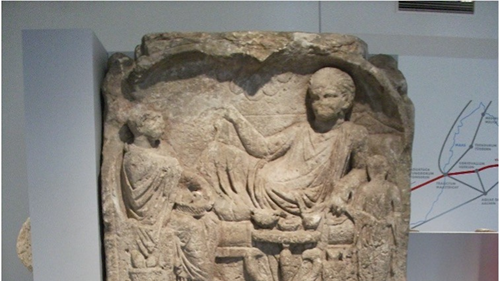
This tombstone from Cologne commemorates Marcus Valerius Celerinus. He had a Roman name, Roman citizenship, and was a veteran. But his tombstone celebrates membership to other communities. He was from Astigi in Spain, and was a civis Agrippinensis, a citizen of Agrippinensium, the Roman name for Cologne. His memory is tied to multiple different places and groups. This gives us an indication of the general makeup of Cologne’s community, but it more importantly demonstrates that personal identities in the Roman Empire were fluid and hybrid. A “Roman” soldier from Spain could settle in Cologne and happily call himself a citizen of Cologne at the same time. It is through memory that Marcus integrated himself forever into these various communities, and in turn established these groups as part of Cologne’s own memory framework."
Week 7: Trying to change Classics for the better, one Zoom meeting at a time
Kevin Xu, 3rd year Classical Studies student
“Hi, I’m Kevin, a third year Classical Studies student and, also, on the committee of London Classicists of Colour as Academics Officer this year. For those who haven’t heard of LCOC (London Classicists of Colour), it’s a student-led society made up of students from the University of London group (UCL,KCL, RHUL, Birkbeck) with the mission to diversify and decolonise Classics. We try to do this by creating a community for students, especially POC (Persons of Colour) classicists, by hosting events like talks, tours, socials and welfare sessions. Our tours are usually some of our more popular events since we aim to introduce more nuance to how we approach heritage by giving a spotlight to more niche items in collections and the history behind their typically dodgy acquisitions. Our tours also try to highlight other Ancient cultures from the world and explore lesser taught subject matters like Assyria. Also, occasional collaborations with other unis or groups lets me really broaden the research I do, for example I am doing a small presentation with KCL-LGBT society soon about queer literature in Ancient China under the title; ‘Tales of tombs, Twinks and T-Shirts’.
(Below - Kevin doing tours talking about Lady Layard’s necklaces’ awful archaeological ethics and the LCOC logo)

But I think some of the really impactful and fun work is getting to know Classics departments at the other London unis to get in touch for changes to improve the way Classics is taught. So, I just wanted to share a little of my work as part of LCOC with our Classics department here at RHUL! It’s been super cool to have organised a departmental meeting where many of the lovely staff here were able to meet online with LCOC committee to discuss potential improvements to inclusivity and diversity along with the preexisting work that the Uni already does to help solve any EDI issues. Getting to work with the Classics department itself feels like real progress in helping improve the way Classics is taught for current and future students to embrace diversity or promoting the field of study to larger demographics. Other meetings with departments at UCL and KCL mean that I hope to help create a promising network of cooperation between universities teaching Classics.
If you’re interested in LCOC, check out our website or social media! It’s a great society for change and meeting new people from some of the other London unis, so I’d totally recommend younger year students check it out. It's been a great way to engage with the Classics department along with academia itself through fun community led work and I’ve loved being part of it for a year-ish now!”
Week 6: Reflections on being a student ambassador
Lily Gregory, 2nd year student
"Hello, my name is Lily, I am a 2nd year Classical Studies student and a student ambassador. I started my job as a student ambassador back in September 2023, and I have enjoyed every moment since. Being able to meet prospective students with similar and also different to me backgrounds has been amazing; being able to see how so many different people have been brought together through Classics has been super eye opening. I was first introduced to Classics at A-Level where I fell in love with the subject, and my teacher, Sam, encouraged me to continue with my Classics education at university, and I did. You could always hear in her voice during lessons how much of a passion she had both for teaching and Classics, and I will always be grateful for her. Sam was an undergraduate student here at Royal Holloway, and it was her encouragement and stories of the university that made me want to come here. When I came here on an Open day and when I began studying here in 2022, I couldn’t have agreed more with her.
Being able to engage with a whole range of prospective students is something I find really fun. In the January 2024 Open Day, I sat in on mini lectures given by Dr Liz Gloyn and Dr Erica Rowan, and getting to see how different individuals began to light up at certain facts or how the lecturers gave the lecture inspired me when going back to my studies after the event. And I still have in mind the face of one particularly enthusiastic visiting student who approached me with really inquisitive questions and the pride in their parents’ face watching discreetly from a little way back. I remember the feeling very well, not being able to get the smile off of my face on Open Days, and even to this day I can be sitting in my lectures, and I can’t hep but smile at how lucky and inspired I feel.
Within the Classics department at Royal Holloway, everything is aimed at making my studies here better, the lecturers are super communicative, and I am always able to contact them whenever I need them, both in an academic and personal way. They are extremely supportive of me, and their feedback helps me to become the best student I can be. It is very nice to be able to have an academic talks with my lecturers but also be able to talk to them about things going on outside of my academic life."
Our fantastic student ambassadors (Lily, left) with Prof. Christos Chremmydas.
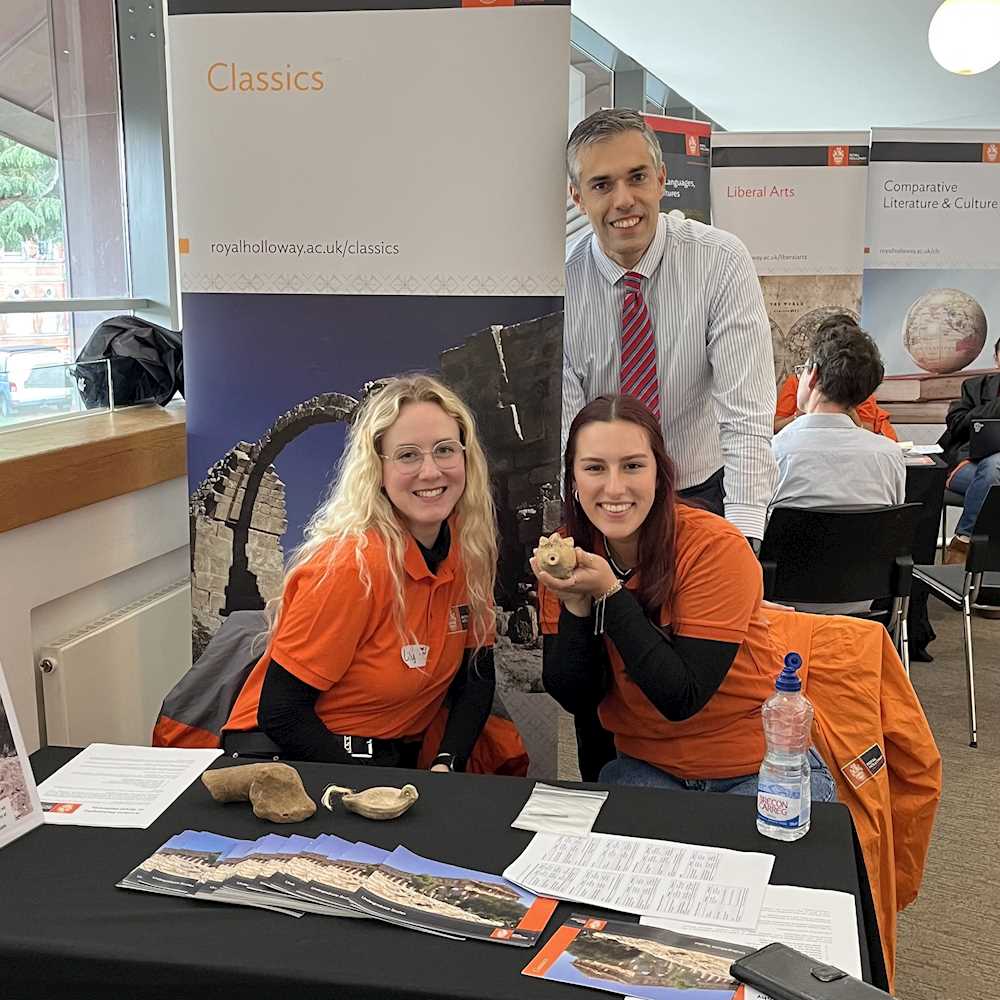
Week 5: Cold, wet and windy with Magnitude Surveys
Ellis Cuffe, 2nd year PhD Classics
'Hello there, I’m Ellis and I’m a Techne-funded PhD candidate in Classics. As a part of my funding arrangements, I am allowed to undertake up to 6 months of CEAs (Career Enhancement Activities). Thomas Sowell was recently asked: "How do you make something of yourself today?". He replied: "You equip yourself with skills that people are willing to pay for." This was in fact my second CEA. Back in 2022, I was a historical researcher for 6 weeks with Lion Television, the guys that produce Horrible Histories.
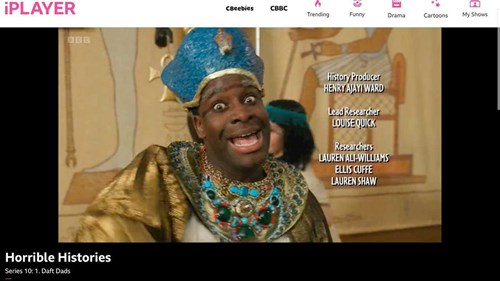
Look! Honest! I am right at the end of the credit roll, juuust as the autoplay feature comes in.
This time, however, I worked for 12 weeks with Magnitude Surveys which is a commercial geophysical survey company based Up Norf’ in Bradford. They look to ‘assess sub-surface archaeological potential', often in advance of planning permission applications for construction and infrastructural projects. In ideal circumstances, we find amazing things like previously-unknown Roman villas or medieval villages; at other times, it's underground services, ridge and furrow or nowt.
What then did the normal day-to-day experience of working with a “geo-fizz” company look like? Well, blisters galore! At least at first for a growing lad with office-made feet. The best piece of advice that I received was to double sock at all times, otherwise you’ll be in for similarly nasty surprises (I won’t share images, it’s before the watershed hour). Moreover, being cold, wet and windswept on the edge of Bronze-age barrow pitted with muddy badger sets is not my usual idea of a nice stroll in the countryside.
We worked away most of the time, so the entire experience was also some sort of strange social experiment in which you need to run with some socially acceptable part of your personality with another human for up to a week at a time. Having been a bookworm for the past decade and not trialled myself in a long time, I was initially hesitant but acclimatised and even started to enjoy working with and getting to know lots of different people. I can now confirm that I am resoundingly…‘normal’.
Once your feet toughen up and you no longer wheeze with each step, you even start to take in the majesty of your surroundings and embrace some pseudo-Buddhist sense of ‘being at one with nature’. This was especially true on bright Winter mornings, crunching to site over frozen cobwebs on the grass. Surveying in Lincolnshire also brought us near to several RAF bases for a few weeks. We were bedazzled with Red Arrows training flights and jet fighters which flew in squadron formations and were dogfighting over our heads. We travelled the length and breadth of the country to places you would rarely dream of visiting – is Sleaford on anyone’s travel bucket-list? Also, no offence to the inhabitants of Sleaford but your river is really more of a stream. I was disappointed.
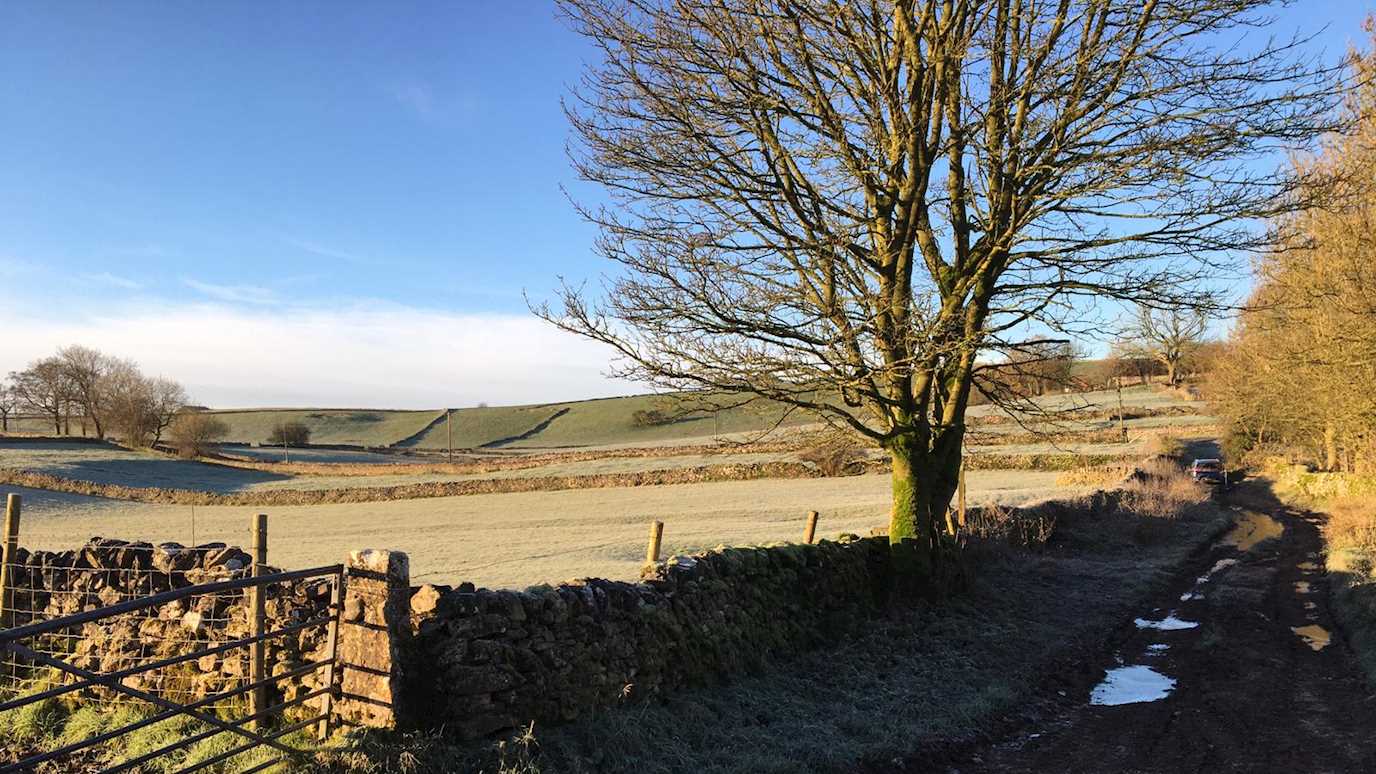

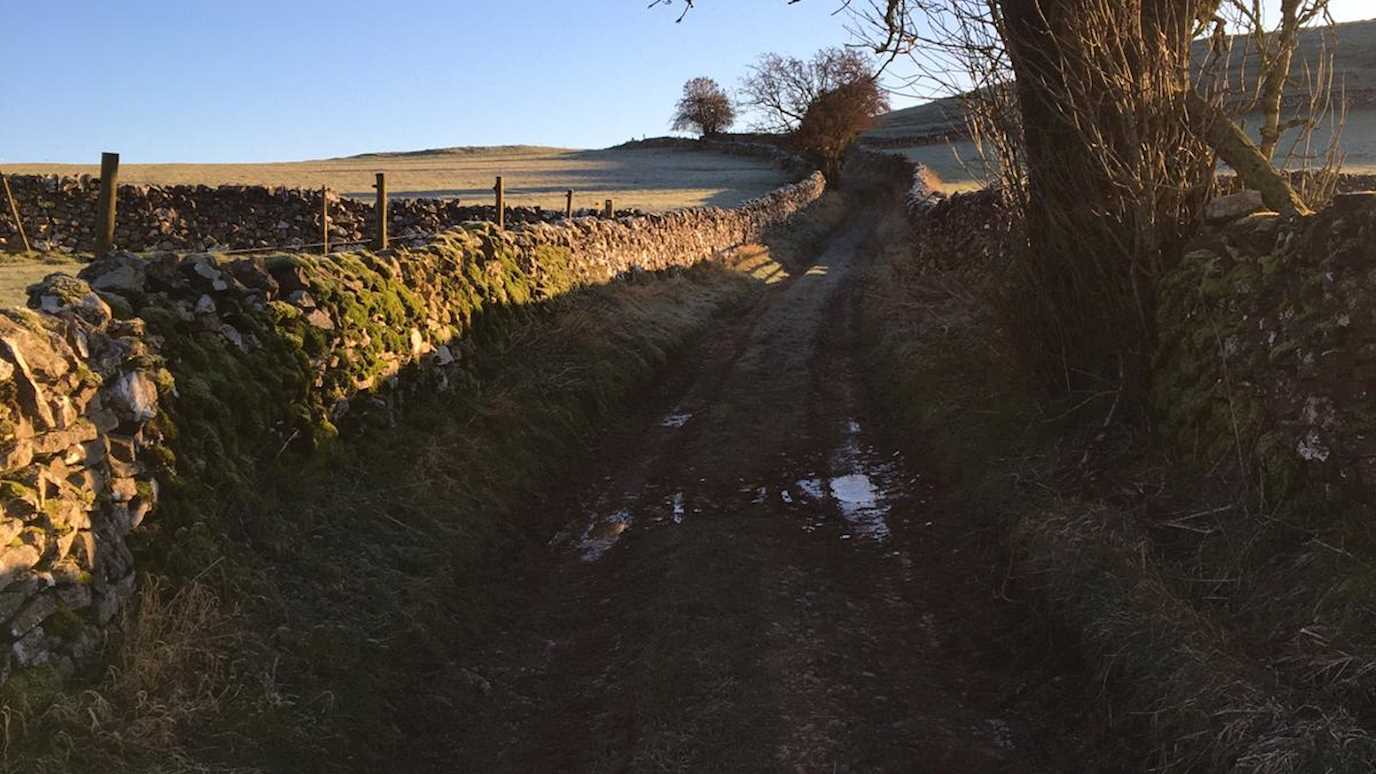
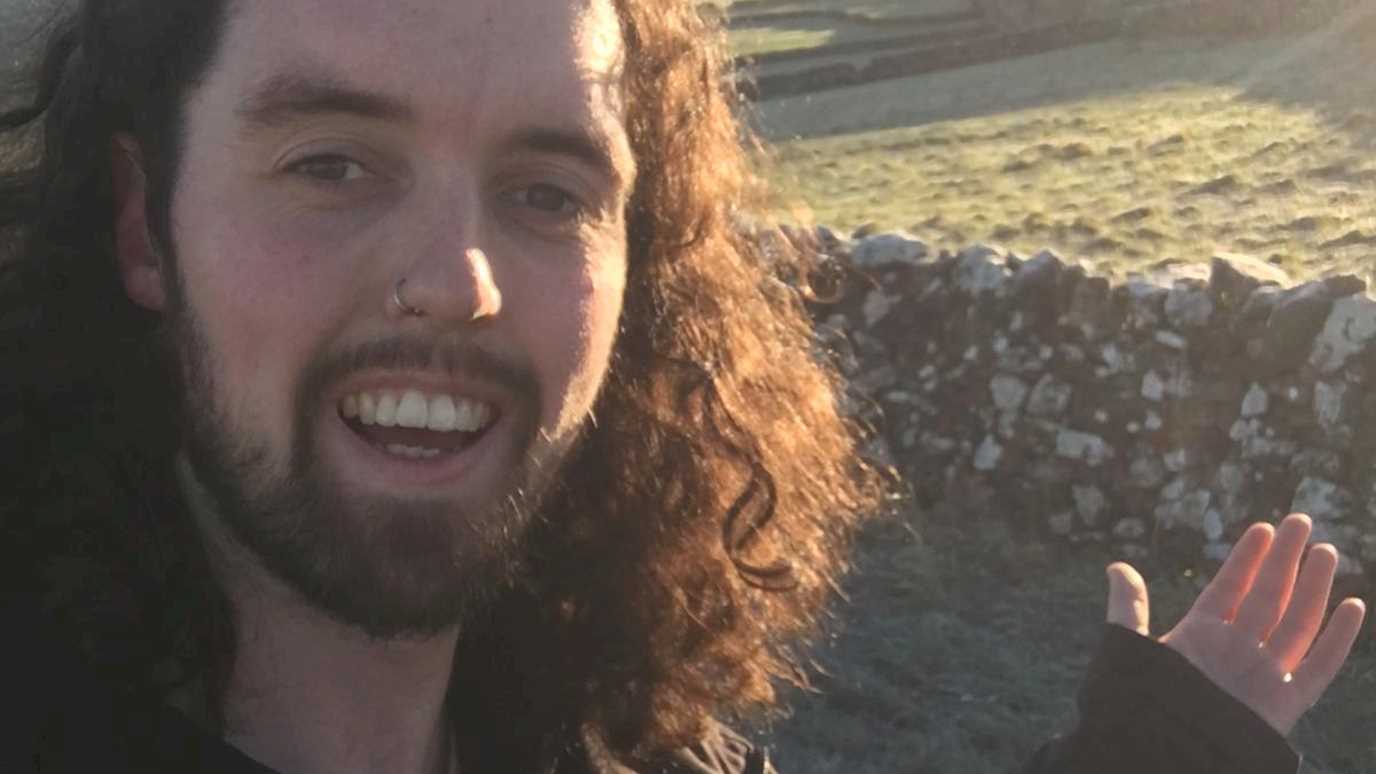
I admit, these are all superficial at the end of the day. It’s because the staff at Magnitude were fantastic and I felt welcome from the get-go. In particular, I would like to give a shout-out to Laika, the Head of Security. I was slightly nervous on my first day walking into the office but Laika, the director’s German shepherd, quickly calmed me down by dumpffing onto my feet and demanding strokes. I felt immediately at home. I also learned loads of new useful skills, including of course geophysical survey skills (especially magnetometry and GPR), but more importantly skills in using GIS as an analytical tool (which is currently on the UK’s shortage skills/occupation list), and even limited knowhow in power-tools (electric sanders and pillar drills being among my favourites. Strangely everyone took a step back when I grabbed one…?). Wonderfully, Magnitude asked for me to keep in touch with them because they’d like me to go back after the end of my PhD. I’ll let you in for a secret – these foot-in-the-door scenarios are invaluable because so many new-born Doctors come out the other side of a PhD with a nice piece of paper, a floppy hat and little else. Magnitude are always on the hunt for new surveyors but I have decided that this was a personalised invitation.
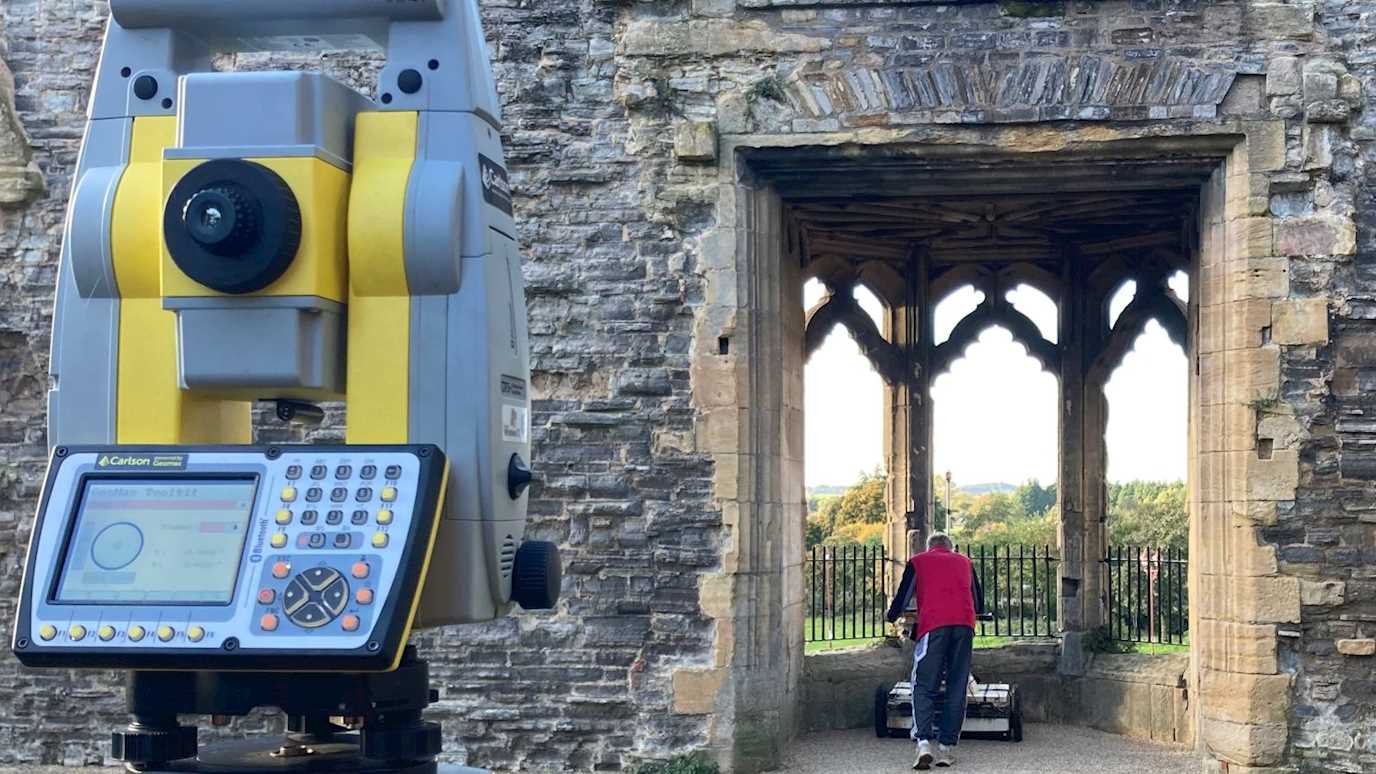

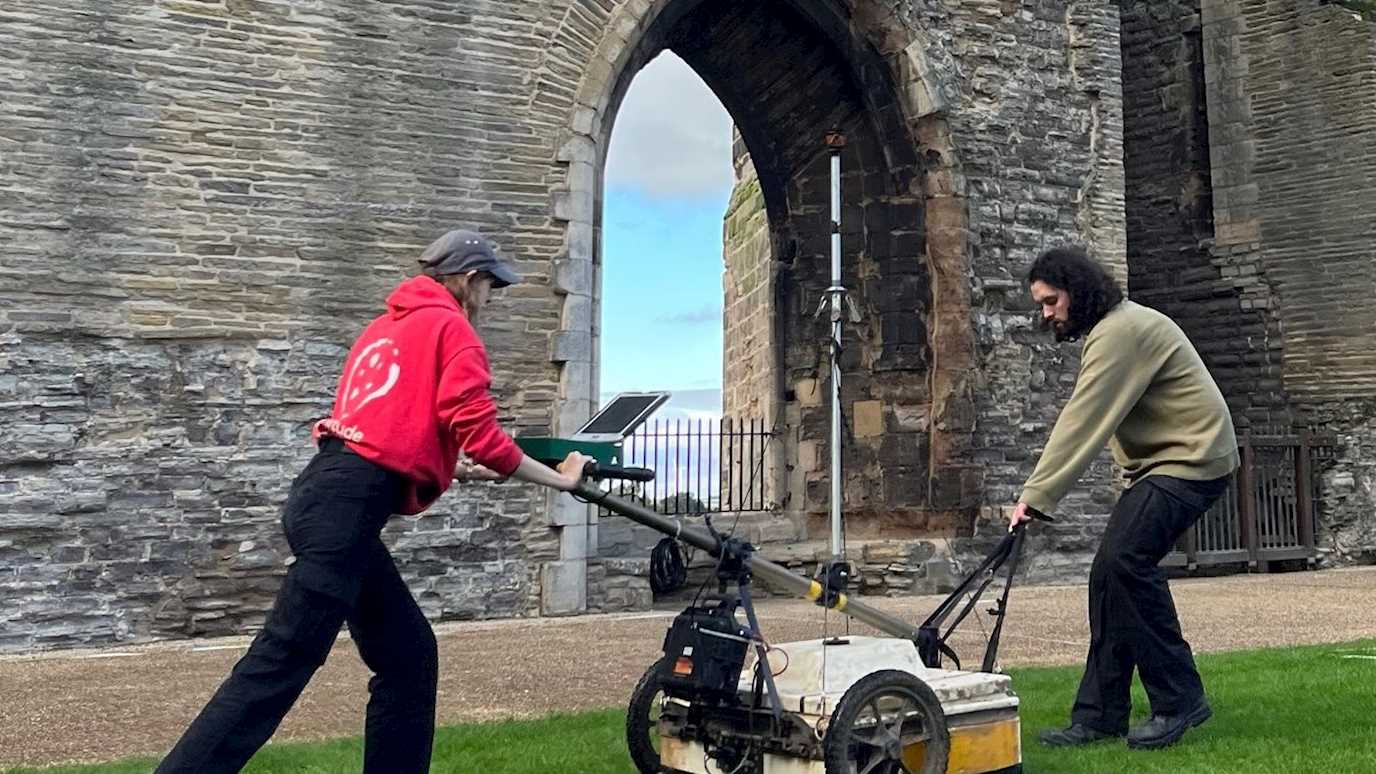
I even received a lovely leaving card. This was in fact my first proper job and therefore my first proper leaving card. I blushed when I received it! The card is covered in ducks and had miniature ducks packed inside of the envelope, too. I must have mentioned that I have Halloween-themed rubber ducks in my bathroom at some point. The things you talk about in the van…you forget after a while…'
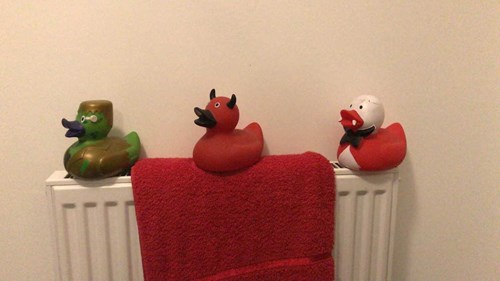
Week 4: My final year dissertation and the National Gallery in London
Ella Bradbury, 3rd year student
"When I first came up with my thesis, ‘Artistic Representations of Ovid’s Metamorphoses in The National Gallery, London’, I was lost at where to start. I had no background knowledge of art history when starting my dissertation, and although I had studied Ovid in detail throughout second year, my lack of expertise when attempting to enter the world of art studies was, of course, daunting. However, I believed in my idea, and this eventually led me to The National Gallery, where I began building my experience of studying classical myth through more than just ancient texts, and into the world of iconography and art history.
The idea for my dissertation had stemmed from my study of Metamorphoses in the second year of my English and Classics degree, where considerable amounts of the study involved reading criticism from scholars who interpreted the mythic traditions in Ovid in less conventional ways, for example reading from a feminine perspective. This is what lead me to combine my interest in art, as I believed that comparing the representation of myths in another medium would create an interesting, insightful, and a slightly unique dissertation.This search for art lead me naturally to Trafalgar Square, through the doors of one of the world’s most renowned galleries, The National Gallery, and even further into room twenty-nine, The Wolfson Gallery, which has slowly become the main focus of my dissertation. Its walls, arranged with Venetian art, display four of Titian’s boldest mythologies, representing three of the most well-known mythologies in Ovid’s Metamorphoses.
Narrowing my dissertation down to just studying this singular room stemmed from visiting the gallery itself. Understanding the true scale of room twenty-nine and the impact of Titian’s mythologies became clear the moment I walked into the Wolfson gallery for the first time. Its pure size, barreled ceiling, and striking green walls combined with the dramatic canvases depicting lively mythologies stood out to me not only as just an impressive representation of Venetian art, but also as something that could be studied in extensive and more importantly interesting detail.
Of all the paintings in the gallery, there was one that stood out to me the most. Titian’s Bacchus and Ariadne is a painting which I believe everybody who has access to London and The National Gallery should strive to go and view in their lifetime. Not only is the painting striking, colourful and dynamic, its iconography is entertaining, and develops the tale of the two lovers using the brief mention that Ovid gives to the pair at the end of ‘Ariadne and the Minotaur’. This painting stood out to me for these very reasons, and although my dissertation goes into extensive detail and somewhat rereads the painting from a feminine perspective, focusing on Ariadne rather than Bacchus and his entourage, when put simply, I believe that this painting is one that should be on anyone who is interested in art, classics, or mythologies lists. If it can strike me enough to produce an eight-thousand-word dissertation on, it is likely to be impactful on anyone else who views it!"
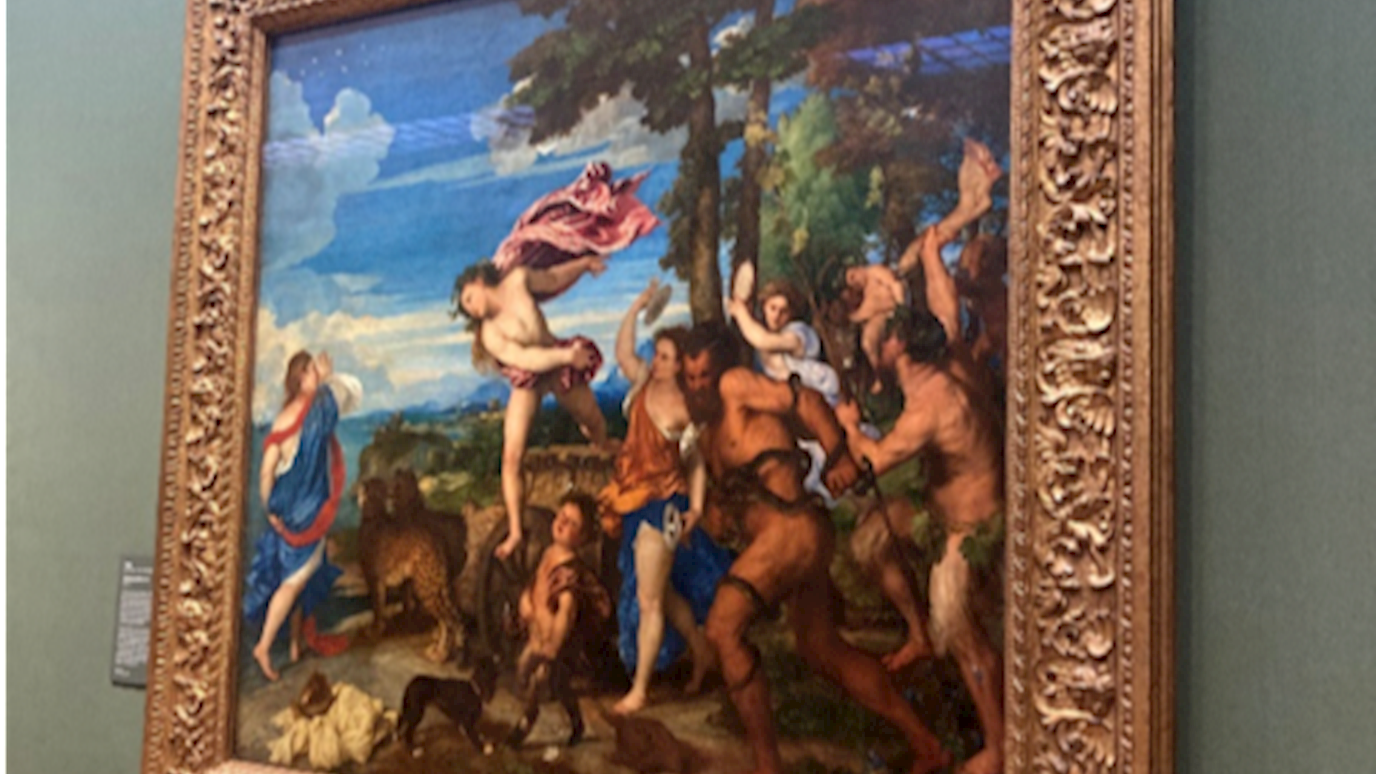

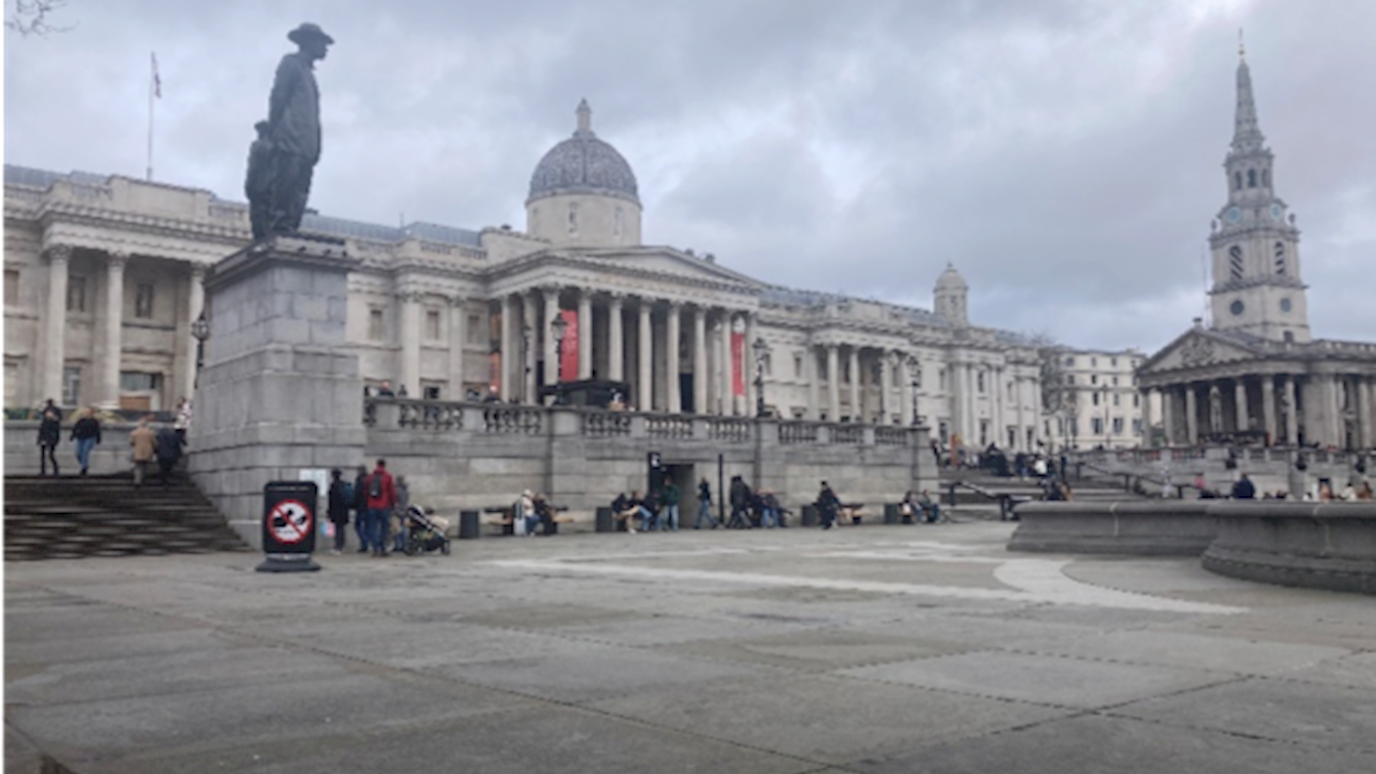
Week 3: Farming for Families: Having fun with Economic History (Really!)
Prof. Richard Alston
“This year I am teaching a year 3 course of social and economic history. We ask key questions: how did the Romans survive? How did Roman society get from generation to generation? And we start with early Rome.
Everything points to the first Romans being very poor. Their farms were really small, often only as big as a football pitch. My class has to work out how they can survive on so little land and what does it mean for their lives and livelihoods. I think what surprised them most is that not having much land affects whom they can marry. So, we role-played scenarios.
Four of them became farmers and they were given varying amounts of imaginary land. So now they had to find someone to marry them. And when someone was deciding to get married, there were more pressing concerns than whether the perspective spouse had nice eyes and an excellent sense of humour. Choose the wrong partner and you or your children don’t get enough to eat. We paired them off; the dowries were exchanged and then we randomly assigned children (with the help of dice). The family property was split in the next generation. Then we repeated the process.
A couple of generations later we had some who were landless and couldn’t attract a partner. Others had quite nice little estates and were looking for people to work for them. And suddenly, we had reconstructed a Roman class structure and we had people muttering about revolutions. From farming to families to class to politics.
But now the class really wants to try their hands at farming. We are trying to persuade someone to buy us a little plot. We can plant grain and vegetables. Maybe we could run to some olives and grapes. We are pretty sure we know how to plough, but less certain that we can find a plough or an ox to pull the plough. We are preparing business plans in the hope of attracting some capital investment.
They are pretty determined that the farm will be in Southern Italy though… I am wondering whether the Classics Departmental budget might run to that. It is after all an excellent investment in the many skills of my talented students.”
Week 2: Classicists at the “Meet the Grads” Night 2024”
Linnie Serstobojeva and Oscar Standidge, 2nd year students
The Humanities School Careers Event on Tuesday was a great success according to all the reports we received both from staff and from students who took part. Classics alumnae, such as Megan Wright (now working in the Charity sector) and Hannah Lessiter (working for a Rare Book firm) and current students were central to the success of the event. Two of the students involved, Linnie and Oscar, have shared their impressions:
Linnie writes: “On Tuesday the 16th of January, I interviewed alumni of Royal Holloway for a careers event centred around helping humanities students. It was my second year helping out at this event, and both years I’ve seen how useful it’s been for students that chose to attend. The evening followed a brilliant format organised by Louise Ogle and her colleagues; for a duration of 10 minutes, myself or my co-presenter, Mia Cavanagh, would improvise questions to ask the alumni speakers that we thought would be commonly brought up, and then students had the chance to speak in depth to alumni at booths outside the lecture hall for further questions.
As a Classics student, I found it particularly wonderful to interview alumni that shared my degree, which was the case for multiple speakers. Especially useful were their talks on ways classics as a discipline had boosted their employability: this came as a reassurance to students with post-graduation job concerns. Lots of people attended the evening from across the humanities departments, and I managed to get some feedback from some Classics students – who only had positive things to say. Most commonly it was brought up that they liked the experience of being able to talk in person to alumni to ask advice, and that the event opened their eyes to career paths they didn’t know existed – or that were possible for them to pursue.
Personally, it was an incredibly fun night, and I was delighted to accept an interviewing role again. The idea of speaking to alumni in front of a filled lecture theatre can seem a bit daunting – especially with how much improvisation goes into it – but as someone looking to go into teaching it was a valuable night. It was so interesting to see how people’s degrees led them to where they were, particularly the classicists, who were employed in such a variety of fields!”
And Oscar adds: “This event was to help humanities students in looking for a job market to do with a humanities degree. Whilst I was there to help out by pouring drinks, and collect the speakers so that they could have their interviews (on what they do for a living and how they managed to get from their degree to their degree), I managed to talk to the speakers which was incredibly helpful in understanding where to go after my degree in Classics.
Of course, I didn't do this by myself, and I was there to help out with 3 other students, Linnie Serstobojeva, was one of the main interviewers for the event, Holly Workman, who also gave up her free time just as I did, to help out at this event as a runner who did a lot more work than I did as she had more people to take into the interviews. There was another student who does English (Mia Cavanagh) who also worked as an interviewer. All these students knew that this was a worthwhile experience and helping out was a very good experience to do. I can say for myself that the event did give me confidence in finding a job after a university degree. All I can say is that the event was useful for those interested in a future in the humanities department and that all who helped should be given the credit and thanks they deserve in making it as enjoyable as possible for those who attended.”
Week 1: Student internships with the Classics department’s Myth and Voice: storytelling for community making project
Dr Efi Spentzou
Dr Efi Spentzou, the Myth and Voice Lead, writes:
“Myth and Voice thrives on the youthful energy, commitment and creativity of our volunteer student co-creators of our participatory Myth and Voice workshops. I am continuously impressed by our students’ ability to think on behalf of others, to put themselves in the shoes of new audiences and to act as enablers of community and expression. So, we are delighted that we can now offer a modest financial recognition to a small part of this rich contribution with a program tailored to the intern students’ needs that will help them develop skills and experience in: co-creation and student-led syllabus design; in working with young people; in getting involved with programs of active citizenship and community programs, more broadly; in storytelling and applied theatre as community building tools.
Linnie Serstobojeva (2nd year undergraduate), Jojo Hills (Masters by Research in Classical Reception) and Tom Barrett (1st year PhD student) are embarking on their internships this January and I very much look forward to mentoring them and supporting their exciting work.
These three internships were made possible due to an educational grant by the Council of University Classical Departments (CUCD) matched by the Royal Holloway School of Humanities - many thanks to both. And please watch this space for the students’ reports later in the year!
If you are interested in finding out about our Myth and Voice community storytelling program please check https://mythandvoice.org/ with info on the workshops, community voices, my reflective journal, gallery and more."
Archives
Autumn 2023
Archived Autumn 2023 entries from our ongoing blog series, ‘Scenes from the Life of the Department’, can be viewed here: https://royalholloway.ac.uk/research-and-teaching/departments-and-schools/classics/news/scenes-from-the-life-of-the-department-autumn-2023/
- Week 1: Thinking Globally - Prof. Richard Alston
- Week 2: Pandora’s Box and The Classics Hour on Insanity Radio station - Mia Ince, Masters by Research in Rhetoric
- Week 3: Cicero on … writing to your tutors - Dr Liz Gloyn
- Week 4: Classics and Dance - Beth Thomson, 4th year student
- Week 5: Our student representative in Seoul, South Korea - Emily Howe, 2nd year PhD student
- Week 6: “City of Athens” trip to Athens: a report and… a video - Madeleine, Emily, Tom, Dominik, James and Gethin, 3rd years
- Week 7: The Vesuvius Project: computer science unlocking the secrets of ancient scrolls - Dr Liz Gloyn
- Week 8: “Dig to Digital” in a teaching lab - Dr Erica Rowan
- Week 9: Summer filming project - Eleanor Atterton (MA Public History) and Maisie-May Gilchrist (MA Classics)
- Week 10: The Classics Society Symposium on “Medicine and Disability in the Ancient World”
- Week 11: A recent Classics Alumna on the National Graduate Development Program - Zoe Norman (BA Classical Studies 2021)
- Week 12: A homemade classical reception project - Chris Richmond, 1st year student



















